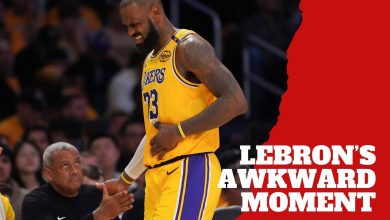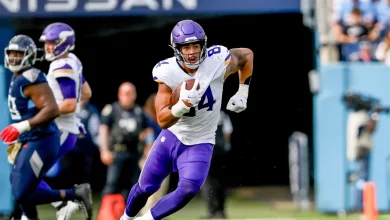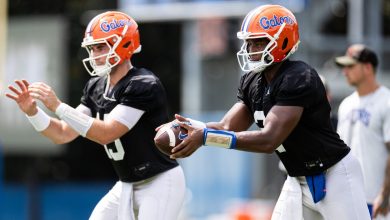The Atlanta Falcons can’t continue to ignore Georgia Bulldogs talent, as local prospects offer immense potential for the team’s future.
In recent years, one of the most prominent and successful football programs in the United States has been the University of Georgia Bulldogs. With consistent success in the SEC, a national championship appearance, and a strong pipeline of NFL talent, Georgia has become an elite source of football talent. Meanwhile, the Atlanta Falcons, the NFL team representing the state of Georgia, have undergone a series of ups and downs in their efforts to rebuild their roster and regain relevance as a competitive franchise. However, despite having a clear connection to one of the most successful football programs in the country, the Falcons have often overlooked or failed to capitalize on the local talent coming from the Georgia Bulldogs.
As the 2025 NFL draft approaches, the need for the Falcons to focus on Georgia Bulldogs talent has never been more pressing. Georgia has produced an incredible amount of elite-level players in recent seasons, many of whom have the potential to make an immediate impact at the professional level. Yet, for one reason or another, the Falcons have not prioritized their hometown stars, which has been a missed opportunity both for team development and for fostering fan engagement in a city passionate about its football.
This article will delve into why the Atlanta Falcons can no longer afford to ignore the wealth of talent coming out of Georgia, how local prospects can improve the Falcons’ roster, and why it makes sense both on and off the field for the team to tap into the Bulldogs’ talent pool.
The Inexplicable Overlook of Local Talent
Over the years, Atlanta has not taken full advantage of the pipeline of talent that Georgia has offered, especially in key areas like offensive and defensive line, running back, and wide receiver. Despite Georgia’s ability to produce NFL-ready players at virtually every position, the Falcons have often passed on opportunities to draft these in-state stars.
For example, in the 2022 NFL draft, the Atlanta Falcons had the 8th overall pick. With the Bulldogs coming off a national championship season, the draft was flush with potential first-round prospects. Yet, the Falcons opted to select USC’s Drake London, a wide receiver, instead of players like Georgia’s Jordan Davis, who was selected by the Philadelphia Eagles. Davis, a mammoth defensive tackle who immediately impacted Philadelphia’s defensive line, could have been a game-changer for the Falcons, who had been struggling to find consistent playmakers in the trenches.
Similarly, in the 2023 NFL Draft, Georgia’s Jalen Carter, an explosive defensive lineman, was a top prospect on many teams’ boards. While the Falcons chose to bolster their offense with the selection of tight end Kyle Pitts in 2021, passing on Carter—who went to the Eagles—remains a notable example of the Falcons ignoring local, high-caliber talent. Carter’s ability to dominate at the defensive line position would have significantly helped the Falcons’ defense, which had been inconsistent in recent years.
In both of these cases, the Falcons missed the chance to capitalize on the talent coming out of Georgia, a local player who could have contributed immediately and with a high ceiling. By failing to prioritize local prospects, the Falcons not only missed out on elite talent but also neglected to build the connection between the team and the local community—something that could have generated enthusiasm and goodwill.
Why It Makes Sense for the Falcons to Prioritize Local Talent
1. Immediate Impact Players
One of the primary reasons the Falcons cannot afford to ignore Georgia Bulldogs talent is the ability of these players to make an immediate impact on the field. Georgia’s football program has consistently developed top-tier athletes who are capable of transitioning to the NFL seamlessly. Players coming out of Georgia’s program often arrive with a pro-ready skill set, honed by some of the best coaching in the country under Kirby Smart.
For example, a player like offensive tackle Broderick Jones, who played an integral role in Georgia’s offensive line during their championship season, would provide instant help to a Falcons offensive line that has struggled with consistency in recent years. Jones is widely regarded as one of the best tackle prospects in the 2025 NFL Draft, and his physicality, footwork, and ability to protect the quarterback would fill a critical need for the Falcons.
Defensively, Georgia produces players like Nolan Smith, a dynamic edge rusher, who could make an immediate difference on a Falcons defense that lacks elite pass-rush ability. Smith’s speed, agility, and experience in big-game situations would elevate the Falcons’ defensive front and help pressure opposing quarterbacks in a division that includes high-powered offenses like those of the New Orleans Saints and Carolina Panthers.
By tapping into the wealth of immediate-impact players coming out of Georgia, the Falcons could address areas of need and add long-term stability to their roster.
2. Fan Engagement and Local Pride
Atlanta is a city that prides itself on its sports teams, and the Falcons are no exception. However, the Falcons have historically struggled to generate consistent fan enthusiasm, especially in recent years as the team has experienced cycles of rebuilding and underperformance. One key element of re-engaging fans and creating a sense of community around the team is to embrace the local talent that comes from Georgia’s high school, college, and pro football pipelines.
By drafting Georgia Bulldogs players, the Falcons can create a sense of connection between the team and the city. Fans who follow the Bulldogs religiously and are passionate about their alma mater would naturally gravitate toward Falcons players who have roots in their community. Additionally, players who are local heroes—who grew up in Georgia, played for Georgia, and are now playing for the Falcons—bring a sense of pride and excitement to the fanbase.
When Georgia’s players enter the NFL, they often enjoy a period of intense local support and attention. Drafting local talent could help the Falcons tap into this existing enthusiasm and deepen the connection between the team and its fans. It’s a marketing and community-building opportunity that the team cannot afford to ignore.
3. Familiarity with the Georgia Football Program
When it comes to development and transition to the NFL, familiarity is key. The Georgia Bulldogs football program is one of the best in the nation at preparing players for the professional ranks. The rigorous competition and coaching that Georgia players experience on a weekly basis prepare them for the demands of the NFL. When a player makes the jump from Georgia to the Falcons, they are not only entering the NFL but are also familiar with the caliber of play and expectations that come with high-level football.
Having Georgia players on the roster gives the Falcons an advantage in terms of preparation. Players who have experienced elite coaching under Kirby Smart’s staff are already equipped with the skills, discipline, and football IQ needed to succeed in the NFL. This familiarity reduces the learning curve and makes these players ready to contribute sooner than others who may not have faced as much top-tier competition in college.
4. Adding Depth to Key Positions
Georgia’s recent draft classes have been loaded with talent at several positions, and the Falcons have several areas where depth is crucial. Whether it’s the offensive line, defensive line, or wide receiver position, the Falcons would benefit from adding more high-quality players who could both contribute immediately and provide long-term depth.
For example, wide receiver Ladd McConkey, who was a standout for Georgia in their national championship run, has the skillset to provide the Falcons with a much-needed slot receiver who can make plays over the middle and open up the field for other offensive weapons. As the Falcons continue to develop their young quarterback and build a balanced offense, McConkey could become a reliable target who provides quickness, agility, and a solid route-running foundation.
On the defensive side of the ball, players like defensive back Kelee Ringo, one of Georgia’s top defensive players, can make an immediate impact on a Falcons secondary that could use a lockdown corner who can match up against the best wide receivers in the NFL. Ringo has shown his ability to thrive in high-pressure moments, and his skill set would immediately improve the Falcons’ defensive backfield.









